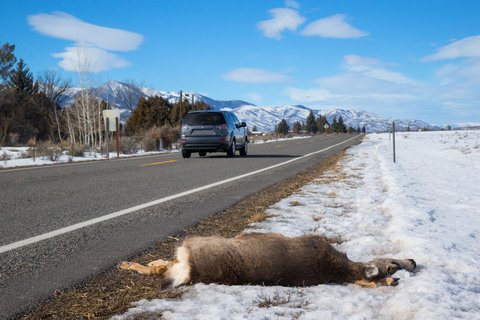Cue the roadkill menu jokes: platter possum, smear of deer, the flat cat stack, whippoorwill on a grill, chunk of skunk, road toad a la mode, center line bovine, and the chicken that didn’t cross the road.
“Your momma’s so ugly, when she looks at road kill it runs away.”
Okay, roadkill is funny. That being said, advocates suggest we make better use of this wasted resource of great tasting, organic, unpolluted and non-corporate natural food.
And they’re right.
But let’s be clear — we’re not talking about peeling week-old possum chips off a hot Texas interstate with a cheap spatula from Guangdong.
American motorists hit 1.23 million deer every year. Those deer are dead, unfortunately (so are a lot of the motorists). But they’re really good, tasty meat (the deer). Plenty would argue that deer meat is safer, tastier and healthier than the plastic wrapped agro-beef you pay an arm and a hoof for at Whopper Mart.
The average American eats 71.2 pounds of red meat each year (beef, pork and lamb), according to the Wall Street Journal.
An average deer might have 40-60 pounds of usable meat. So why let those tons of steaks, chops and burger go to waste?
Idaho has a 4-year-old law allowing people to salvage roadkill that has proved surprisingly popular.
Fish and Game says more than 4,800 animals have been salvaged from Idaho’s roadways since the law took effect. That includes 1,996 whitetail deer, 1,405 mule deer, 798 elk and 308 moose. And that’s only 15 percent of the 35,000 road kills recorded during that period.
In Idaho if you hit an animal, or see someone else hit one, it’s okay to butcher the animal and keep the meat.
Potato Staters who pick up animals must submit a report within 24 hours and will receive a salvage permit within 72 hours. That may seem bureaucratic, but keep in mind that game wardens take a dim view of people driving around with wild game out of season (“Gee officer, I found it by the road”). Plus butcher shops won’t handle wild game without paperwork showing it’s legal.
In Washington and California, it’s not legal. Colorado allows it if you first get a donation certificate or Division of Wildlife tag. Arizona collects carcasses to feed Mexican wolves (what would Donald Trump say?). Animals may be collected for personal use or for food charities in Alaska, Utah, Montana, Wisconsin, New York, Florida, West Virginia and Illinois.
Nevada says dead animals are the state’s responsibility, “and are usually taken to the closest facility that has an incinerator.”
When the roadkill is male, some people just want to collect the antlers – which can be worth quite a bit. Under Idaho law that’s fine. Elsewhere you better check.
Of course, in a place like Idaho there’s a high probability that a random motorist – male or female – will know how to field dress a deer. The odds of that in say, California or New York, are somewhat less. Okay, they’re way less. Actually miniscule. So the two questions you have to ask yourself are (1) is it legal in your state, and (2) can you field dress an animal and take care of the meat properly?
To answer number one, check with your state department of fish and game. Regarding number two, there are any number of “how to” websites and videos that can help you out. If you’re an experienced hunter, then maybe you should put a tarp and a pair of gloves in the car, just in case.
© Mikael Males | Dreamstime.com – Travel Hazard of deer crossing








